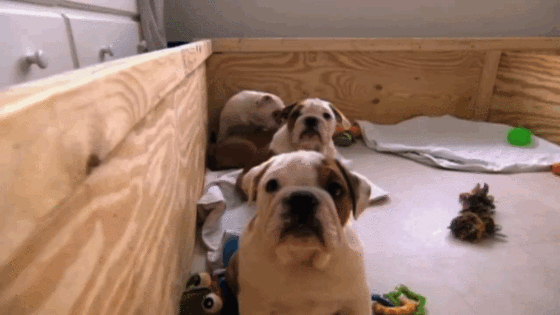Photos courtesy of Brooke Blevins, Ashley Crotteau and Jenna LeBleu. Gif courtesy of Giphy.
CASSANDRA STEC | STAFF REPORTER | cmstec@butler.edu
Fostering and adoptions are on the rise as people find ways to face quarantine. Despite the daily intake of puppy photos supplied by @thebutlerblue, some Butler students found themselves in need of the real thing.
Enter two French bulldogs and a German shorthaired pointer.
Brooke Blevins, a junior human communication and organizational leadership major, adopted an 8-week-old female German shorthaired pointer from Pennsylvania. Blevins’ family already has two older dogs, but have wanted to introduce a puppy before the eldest — Louie — passed away. The pup is yet to be named, but the family is considering “Sam” as a frontrunner.
“We figured this was a great time since my siblings are home from college and my parents are working from home,” Belvins said in an email to The Butler Collegian.
Senior biochemistry major Ashley Crotteau purchased 4-month-old French bulldog Frankie in March. Crotteau plans to attend graduate school next year so she wanted to get an animal to bring with her. Because she has much more time now than anticipated, she decided that now was the best time to get a puppy and train him.
“I had never owned my own pet but I have always had dogs growing up in my family,” Crotteau said in an email to The Butler Collegian. “He’s been keeping me very busy and getting me outdoors a lot, which is good for me mentally.”
Jenna LeBleu, a strategic communications major who graduated this past December, purchased nine-week-old French bulldog Lola from a breeder in Arkansas. LeBleu grew up around dogs, but Lola is the first dog that she can call her own.
“I made the decision to adopt a puppy because I have wanted one ever since I moved into my apartment post-grad,” LeBleu said in an email to The Butler Collegian. “Because I started my full-time job this past month and we are working from home, I thought this would be the perfect time to adopt and train a puppy since I have a lot of spare time on my hands.”
Lisa Farley, an associate professor in the college of education, teaches the Wagging, Walking and Wellness Physical Wellbeing course. The course collaborates with the Indy Humane Society to combine physical activity, civic awareness and community service.
Farley believes the mental and emotional benefits that result from having an animal can be incredibly helpful in times of stress.
“When you have to care for another being like a dog or cat, you are forced to think of someone other than yourself,” Farley said in an email to The Butler Collegian. “You need to anticipate their needs, physically care for them, and sometimes those animals can make you smile, laugh, be happy, which helps someone physically secrete dopamine.”
Farley believes that the emotional benefits are easier to discuss and see than the mental benefits.
“There are studies that show that the physical act of petting a cat or dog can reduce blood pressure,” Farley said in the email. “Because of the body’s response to humor and overall interest of playing with animals and the secretion of serotonin, people with pets tend to be calmer and more relaxed, which reduces stress overall. Walking a dog helps reduce muscle tension as well. Any animal lover will tell you that the act of touching the animal is soothing in itself.”
Blevins, Crotteau and LeBleu all agree that their puppies have helped them in more ways than one.
Crotteau and her roommates have had a great experience with puppy Frankie.
“I think getting my puppy has been great emotionally,” Crotteau said in the email. “Who doesn’t love dog kisses when they are feeling sad?”
LeBleu thinks that Lola has helped keep her busy especially with the isolation that can come from quarantining. She especially loves when Lola sleeps in her lap while she is working.
While the desire to adopt a furry friend at such a lonely time can be tempting, Farley cautions against getting a pet without thinking about the hidden costs, as well as what will happen once everything returns to normal.
“They cost more to own than just the initial fee to get them home,” Farley said in the email. “So it’s important to look at the hidden costs, especially in this new economic situation. Also, we will return to some type of ‘normal’ again, and it’s important to be able to know where your animal will be when you return and how they will be cared for. Are you able to tend to their needs if you go back to school, work and all the social occasions?”
If individuals want to still get the mental and emotional benefits of having a pet, but do not feel comfortable committing to it long-term, Farley suggests fostering as the best option during quarantine.
“Often the fostering is of no cost to the families who take them in,” Farley said in the email. “They stay in contact with the shelter — like the Humane Society of Indianapolis — who continues to provide food, bedding, toys and medical assistance to those animals. This is often as brief as two weeks and can be as long as a few months, as the animals are awaiting their forever homes. People who are interested in that should contact their local shelters.”










